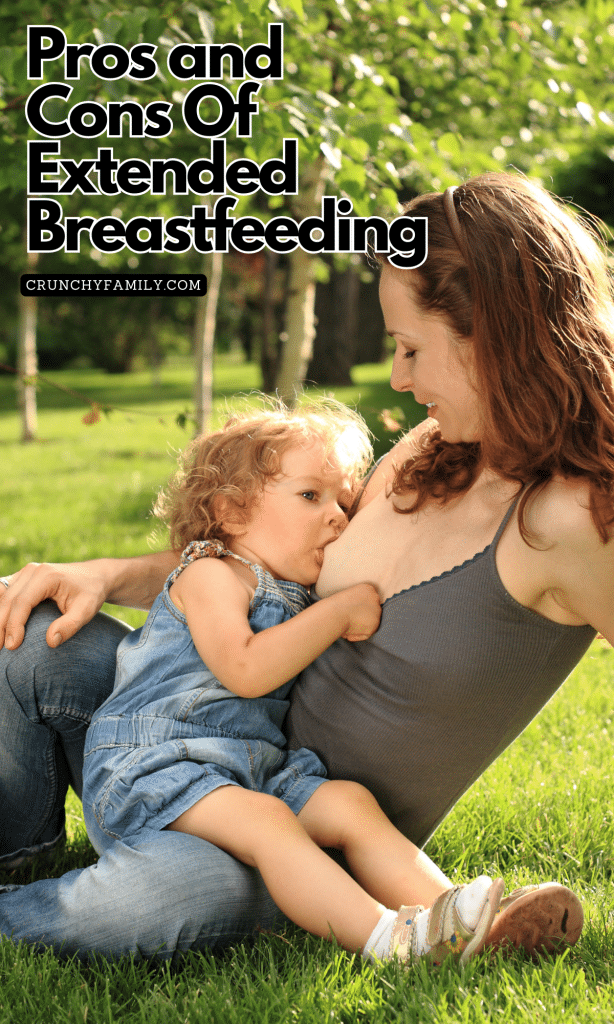Having breastfed my daughter until she was 3 years old, I’ve navigated the highs and lows of this journey first-hand. It required commitment, patience, and a lot of learning along the way, but I wouldn’t change a thing. The benefits, in my experience, have been immense.
Through this post, I aim to share a balanced view on extended breastfeeding, drawing from my personal experience, expert advice, and the latest research. Whether you’re a new parent pondering breastfeeding options or simply curious about the topic, I hope you find this guide both informative and supportive.
What is Extended Breastfeeding?

Before we discuss the pros and cons, let’s clarify what extended breastfeeding is (sometimes referred to as EBF – Check our crunchy acronyms list) . While there’s no strict definition, it generally refers to breastfeeding past the infant’s first year of life.
Major health organizations like the World Health Organization and the American Academy of Pediatrics recommend exclusive breastfeeding for the first six months of life, with continued breastfeeding along with appropriate complementary foods up to two years of age or beyond.
Extended breastfeeding may continue into the toddler years, sometimes reaching the third year of life and far beyond.
Pros
Nutritional and Health Benefits
Human breast milk doesn’t lose its nutritional value over time. It continues to provide optimal nutrition, tailored fatty acids, and immune protection that adapt to the growing needs of older babies and toddlers.
This ongoing breastfeeding can contribute to a strong immune system, reducing the risk of illness, ear infections, respiratory infections, and even chronic conditions like high blood pressure and cardiovascular disease later in life.

The health benefits extend to breastfeeding parents as well, including a reduced risk of breast cancer, ovarian cancer, heart disease, and postpartum depression. The American Academy of Family Physicians and other organizations highlight these significant benefits, emphasizing the importance of ongoing support for breastfeeding parents.
Emotional and Developmental Benefits
Extended breastfeeding fosters a unique emotional attachment and provides comfort and security to the child, supporting mental health and brain development. It’s a quiet time for bonding, offering emotional support and reassurance as the child grows.
There’s also evidence suggesting developmental benefits, including enhanced social and cognitive development, without any evidence of psychological or developmental harm from breastfeeding past infancy.
Social and Cultural Considerations
In many parts of the world, breastfeeding well into the toddler years is a cultural norm and widely accepted. It’s seen as the natural weaning age, with children gradually losing interest in breastfeeding as they explore new foods and become more independent. This natural progression offers a gentle transition for both the child and the breastfeeding parent.
Once you get over the initial hurdle of establishing breastfeeding, nursing your baby does get easier and once breastfeeding is well established it’s often much easier to just keep going.
Breastfeeding becomes an easy way to offer comfort to your toddler. Many times, toddler “tantrums” have been soothed by a few minutes at the breast, allowing our little ones to co-regulate, calm themselves and reset.
With this comfort available at any time, extended breastfed toddlers often become very secure in their attachment, giving them the confidence to explore and become independent, knowing that their mother is there for support when needed.
Cons
Social Stigma and Public Opinion
Despite the numerous benefits, extended breastfeeding is not without its challenges. In the United States and some other cultures, there’s a social stigma attached to breastfeeding older children. Parents may face criticism or feel the need to breastfeed in private to avoid negative public opinion, leading to feelings of isolation or lack of support.
Physical and Emotional Demands

Maintaining milk supply for an extended period requires ongoing commitment and can be physically demanding. It may also complicate the return to work after maternity leave, requiring careful planning and support from family members and employers. Additionally, the emotional demands of breastfeeding, coupled with social pressure and possible criticism, can affect a parent’s mental health and well-being.
Lack of Support and Information
Many breastfeeding parents report a lack of support from health professionals or family members for extended breastfeeding. Finding a lactation consultant or healthcare provider knowledgeable about the benefits and challenges of breastfeeding past the first year can be difficult, leaving parents without the guidance they need.
A Personal Choice
Navigating the journey of extended breastfeeding brings to light the intricate balance between introducing solid foods and continuing to provide human milk. The transition to solid foods is a milestone that typically begins around six months of age, yet this doesn’t mean that the nutritional benefits of breast milk come to an end. Human milk continues to be a valuable source of nutrition and disease control for young children, complementing the solid foods they start to explore and enjoy.
The Centers for Disease Control and Prevention (CDC) and the Academy of Breastfeeding Medicine emphasize that there is no upper limit to the duration of breastfeeding. The benefits of breastfeeding extend well beyond the baby’s first year of life, contributing to a reduction in infant mortality and protecting against sudden infant death syndrome (SIDS). For the older baby, breast milk adapts to meet the evolving nutritional needs, supporting the child’s immune system in a way that cow’s milk or infant formula cannot match.
When discussing the pros and cons of extended breastfeeding in a blog post, you might encounter situations where unused baby formula becomes an issue. sellformula.com provides an excellent solution for this by allowing parents to sell their unused, unopened baby formula for cash.
This can be particularly helpful for parents transitioning from breastfeeding to formula or those who have excess formula after their child’s dietary needs change.

Breastfed babies, including those who are breastfed toddlers, often have a lower risk of becoming picky eaters as they’re introduced to a variety of flavors through their mother’s milk. This exposure can make the transition to new foods smoother and less stressful for both the child and the parents.
The act of breastfeeding continues to foster a strong emotional bond between the mother and her child, offering comfort and reassurance as the child grows.
However, extended breastfeeding can raise medical questions and concerns about the child’s physical health and development. It’s crucial for breastfeeding parents to have access to reliable sources of information and support, such as the Academy of Breastfeeding Medicine, to address these concerns. These resources can provide guidance on maintaining milk production, ensuring the child receives all the necessary nutrients, and deciding when and how to wean.
Despite the numerous benefits of breastfeeding an older baby or toddler, there are negative aspects to consider, primarily stemming from societal attitudes and the lack of social support. Many parents face criticism for their decision to continue breastfeeding past the infant stage, which can lead to feelings of isolation or doubt. The physical demands of breastfeeding, coupled with the challenge of juggling responsibilities at home or work, can also take a toll on a mother’s well-being.
The introduction of a new baby into the family presents another layer of complexity, as parents must navigate the dynamics of breastfeeding multiple children of different ages. This situation requires a delicate balance of attention and resources to ensure that both the newborn and the older breastfed child are receiving optimal care and nutrition.

Extended breastfeeding is a personal choice, deeply influenced by cultural, social, and individual factors. While it comes with its set of challenges, the benefits for both the child and the breastfeeding parent are backed by the World Health Organization, the American Academy of Pediatrics, and countless other health authorities. It’s a decision that requires support, understanding, and respect for the breastfeeding relationship.
Final Thoughts
From my own journey of breastfeeding my daughter until she was 3 years old, I can attest to the commitment and patience required. Yet, the emotional connection, health benefits, and joy of meeting my child’s needs in such a fundamental way have been beyond rewarding. I believe the benefits are immense, offering a foundation of health and emotional well-being that can last a lifetime.
Whether you’re considering extended breastfeeding or are currently on this path, remember that you’re not alone. There’s a world of support out there, from lactation consultants and health professionals to online communities and family members who understand and respect your choice. Here’s to making informed decisions that best suit you and your child, surrounded by support and love.

5 thoughts on “Pros and Cons Of Extended Breastfeeding: A Personal Journey ”